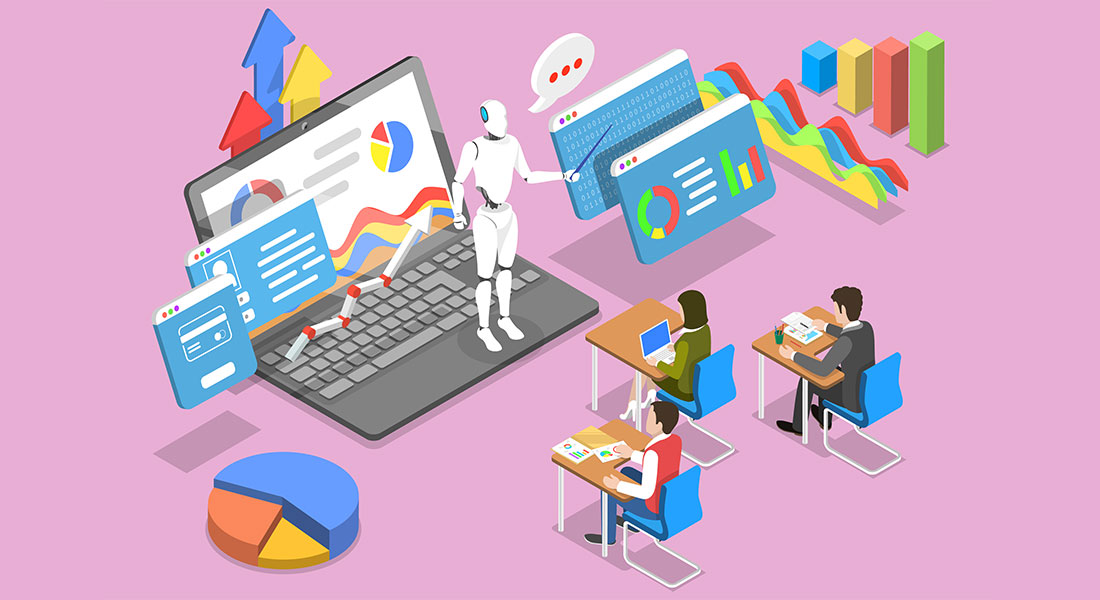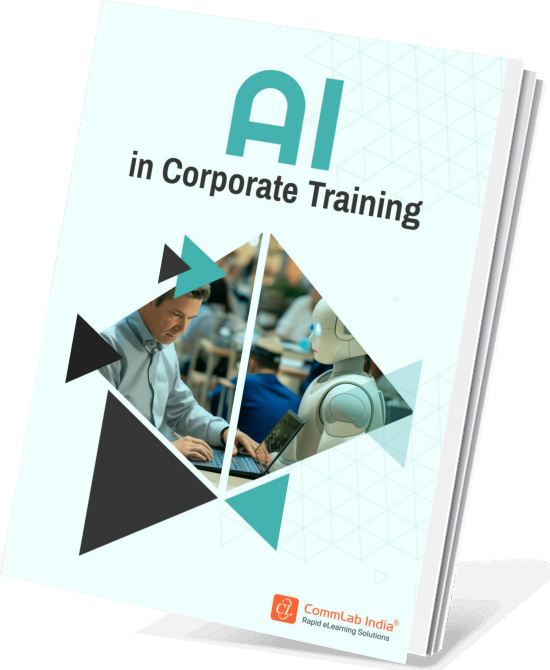What Makes AI a Powerful Ally for Building Future-Ready Corporate Training?

Artificial intelligence isn't science fiction anymore. It's the new reality, quietly reshaping how we live and work. Machines can now mimic human intelligence, handling tasks with speed and precision that were once unimaginable. This revolution is profoundly impacting every industry, and learning and development is no exception. Let’s explore how AI is transforming corporate training, from automating mundane tasks to personalizing learning experiences. Discover how you can leverage AI to accelerate results and build a future-ready workforce.
→ Download Now: AI in Corporate Training [eBook]
Table of Contents
- What are the Benefits of AI in Corporate Training?
- What are Challenges of Implementing AI in Corporate Training?
AI is Making a Significant Impact in the Corporate Learning Space.
Here's how AI supports corporate training:
- AI streamlines eLearning design by automating tasks and generating basic modules.
- AI tailors learning paths based on individual needs, boosting performance and satisfaction.
- AI adapts content for diverse learners and identifies unconscious bias in training materials.
- VR/AR simulations powered by AI create safe environments for practicing critical skills.
What are the Benefits of AI in Corporate Training?

1. Faster Course Development
AI’s ability to process vast amounts of data with lightning speed is a game-changer for rapid eLearning design and development. By understanding complex workflows and generating basic learning modules, AI streamlines the design process. Repetitive tasks, easily handled by AI, free up instructional designers to focus on creativity and strategy.
Imagine crafting training content in multiple languages without the usual translation hurdles. AI-powered automation makes this possible, expanding your reach and impact. This is just the beginning. As AI evolves, it promises to revolutionize how we create, deliver, and personalize learning experiences.
2. Personalized Learning
AI's ability to analyze individual learner data offers unprecedented personalization. By identifying strengths and weaknesses, AI can tailor learning paths, optimize task allocation, and suggest targeted development areas. This precision boosts employee performance and satisfaction.
Furthermore, AI excels at understanding and adapting to cultural nuances. In our increasingly diverse workplaces, AI can help create inclusive learning experiences by delivering culturally relevant employee training content. This fosters a sense of belonging and enhances knowledge retention among learners from various backgrounds.
How to Create Personalized Learning Experiences with ChatGPT? [VIDEO]
3. Less Stress Inducing (Specially for DEI)
AI is more than a tool; it's a powerful ally in advancing diversity, equity, and inclusion (DEI). By personalizing learning experiences based on individual needs and preferences, AI helps to level the playing field and ensure equitable opportunities for all learners.
Moreover, AI can analyze vast datasets to uncover unconscious biases in content and delivery methods. This data-driven approach enables organizations to identify and address DEI challenges proactively, fostering a more inclusive learning environment.
By removing barriers to access and creating tailored experiences, AI empowers learners from diverse backgrounds to reach their full potential.

AI in Corporate Training
Partner, Not Replacement
- AI in Corporate Training
- AI Toolkit for Super-charged Learning
- Challenges to Consider with AI Implementation
- And More!
4. Provide Critical Training in Safe Atmosphere
VR and AR, when combined with AI, offer unparalleled potential for instructional design, especially in high-risk industries. By creating immersive simulations, AI can provide real-time feedback, enabling learners to practice critical skills in a safe, controlled environment. This approach is invaluable for roles demanding rapid decision-making under pressure, such as those in mining or heavy machinery operation.
Through AI-enhanced instructional design, learners can develop muscle memory and build confidence before ever stepping into a hazardous situation. This not only improves job performance but also enhances employee safety and well-being.
What are Challenges of Implementing AI in Corporate Training?
1. High Development Cost
Implementing AI in corporate training is a strategic move, but it demands significant investment. Upgrading infrastructure, developing AI-specific skill sets, and fostering a culture receptive to automation can be costly and time-consuming. Consequently, substantial financial commitment often restricts AI adoption to larger organizations with the resources to absorb these upfront expenses.
Moreover, achieving a positive training return on investment (ROI) can be challenging, as it requires careful planning, execution, and measurement. This financial hurdle underscores the need for a clear and compelling business case before embarking on an AI initiative.
2. Privacy Concerns
The capacity of AI to process vast amounts of data raises significant privacy concerns. As AI systems collect and analyze information, both organizational and personal data become vulnerable to potential breaches or misuse.
The specter of personalized advertising, where data is harnessed to target individuals, highlights the potential risks associated with AI. Organizations must prioritize data protection and implement robust security measures to safeguard sensitive information.
Transparency and ethical considerations are paramount as organizations navigate the complex landscape of AI and privacy. Building trust with employees and stakeholders is essential for successful AI adoption.
3. Susceptible to Biases
AI's potential in employee training is undeniable. However, it's crucial to acknowledge the risk of bias. If the data used to train AI algorithms reflects human prejudices, the resulting training content can perpetuate these biases. Imagine AI-powered modules reinforcing gender stereotypes or overlooking diverse learning styles.
This underscores the need for careful curation of training data. By ensuring data diversity and inclusivity, organizations can leverage AI to create unbiased and equitable learning experiences for all employees.
4. Machine Mishaps
While AI promises an exciting future for online training, it's vital to consider the potential for technical glitches and security vulnerabilities. Just as your smartphone can malfunction, AI systems are susceptible to hardware or software failures. These issues can range from minor disruptions to complete system outages, hindering training delivery.
Furthermore, online training platforms powered by AI are susceptible to cyberattacks. Hackers could exploit security weaknesses to access sensitive data or disrupt training programs. Implementing robust security measures is crucial to mitigate these risks and ensure a reliable learning experience.

Wrapping Up
AI in L&D presents challenges, but abandoning its potential isn't the answer. The key lies in responsible implementation.
Here's a roadmap to success:
- Prioritize data privacy: Establish transparent policies to safeguard learner data and prevent misuse.
- Invest in upskilling: Empower employees to work seamlessly with AI, addressing job security concerns.
- Monitor for bias: Regular audits of AI systems ensure unbiased learning experiences for all.
AI is a powerful tool, not a dark force. Just as the once-revolutionary Microsoft Word transformed our work, AI has the potential to streamline L&D and create new, exciting learning possibilities.
Ready to transform your training initiatives with the power of AI? Download our comprehensive guide, "AI in Corporate Training," and discover how to leverage this innovative technology.
Editor's note: This post was originally published in June 07, 2023 and has been updated for comprehensiveness.





